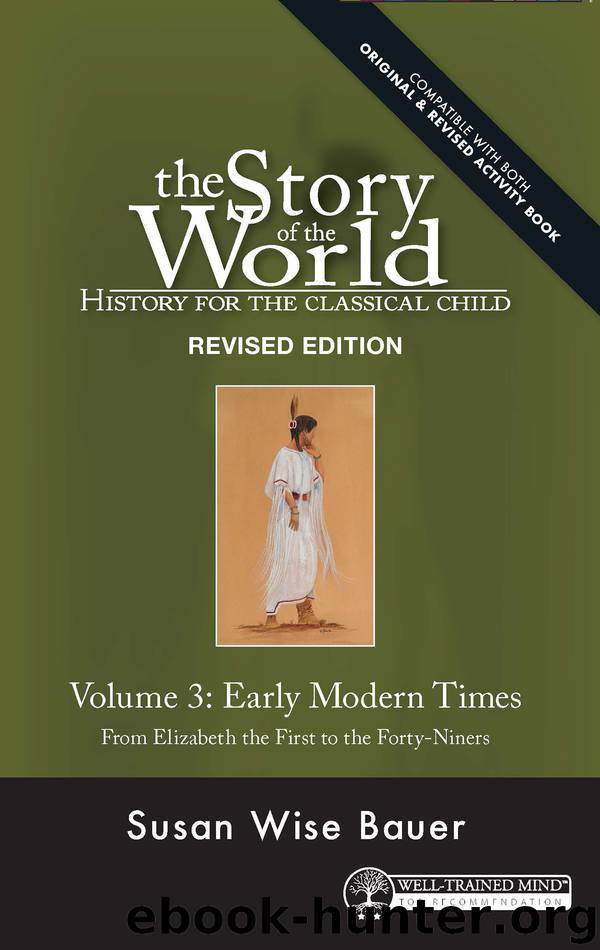History for the Classical Child: Early Modern Times, Volume 3 by Susan Wise Bauer

Author:Susan Wise Bauer
Language: eng
Format: epub
Publisher: The Well-Trained Mind Press
Published: 2020-02-03T16:00:00+00:00
The First American President (1789–1797)
After the Constitutional Convention was over, George Washington went home. He was almost sixty years old. He’d fought in the French and Indian War. He’d led the War for Independence. Now, he wanted to stay on his farm in Virginia, feed his animals, work in his garden, and sit with his wife in front of the fireplace in the long, quiet evenings.
But the delegates who had signed the Constitution begged George Washington to become the first President. Many Americans were nervous about this new office. They were afraid that the President would soon become a king. And the delegates knew that George Washington would never try to become the king of America.
Washington didn’t want to be king of America. He didn’t even want to be President. “It is my great and sole desire to live and die, in peace and retirement on my own farm,” Washington told Alexander Hamilton. “I call heaven to witness that this very act would be the greatest sacrifice of my personal feelings and wishes that ever I have been called upon to make.”
But George Washington also believed that he had a duty to the people of the United States. If they wanted him to be President, he would have to accept.
The first elections for a President of the United States were held in February of 1789—and Washington won unanimously. As he had promised, he accepted the job of first President. But he wrote in his diary, “[I begin the presidency] with a mind oppressed with more anxious and painful sensations than I have words to express.”
Washington had to ride to New York, the temporary capital of the new United States, to be sworn in, or inaugurated, as President. He was hoping for a quiet journey—but every time he got near a town, people ran out and cheered. Little girls threw flowers. Men took off their hats. Church bells rang! When he rode through Philadelphia, he had to parade under triumphal arches built just for his honor. Finally, he arrived in New Jersey, where a barge would take him across the water to New York. He found the dock covered with a red carpet, soldiers standing at attention all along it. The barge he would ride on was covered with flags and rowed by thirteen men, each representing one of the thirteen states. As the barge pulled away from the dock, a whole parade of ships fell into line behind it: a Spanish warship, with its crew cheering; a floating choir singing songs in honor of Washington; and dozens of small ships filled with cheering Americans.
The barge docked near Wall Street. When Washington stepped onto New York’s streets, he saw the roofs and sidewalks crowded with people, cheering and shouting his name. “The streets were lined with the inhabitants as thick as the People could stand,” one man wrote back to his wife, describing the scene. “Men, women, and children—Nay, I may venture to say Tens of Thousands. . . . Heads standing as thick as Ears of Corn before the Harvest.
Download
This site does not store any files on its server. We only index and link to content provided by other sites. Please contact the content providers to delete copyright contents if any and email us, we'll remove relevant links or contents immediately.
| Arts & Humanities | Health |
| Language Arts | Library Skills |
| Mathematics | Reading & Phonics |
| Science & Technology | Social Studies |
The Art of Coaching Workbook by Elena Aguilar(51136)
Trainspotting by Irvine Welsh(21608)
Twilight of the Idols With the Antichrist and Ecce Homo by Friedrich Nietzsche(18602)
Fangirl by Rainbow Rowell(9213)
Periodization Training for Sports by Tudor Bompa(8237)
Change Your Questions, Change Your Life by Marilee Adams(7718)
This Is How You Lose Her by Junot Diaz(6857)
Asking the Right Questions: A Guide to Critical Thinking by M. Neil Browne & Stuart M. Keeley(5741)
Grit by Angela Duckworth(5576)
Red Sparrow by Jason Matthews(5450)
Paper Towns by Green John(5163)
Room 212 by Kate Stewart(5091)
Ken Follett - World without end by Ken Follett(4705)
Housekeeping by Marilynne Robinson(4420)
The Sports Rules Book by Human Kinetics(4367)
Double Down (Diary of a Wimpy Kid Book 11) by Jeff Kinney(4252)
Papillon (English) by Henri Charrière(4238)
The Motorcycle Diaries by Ernesto Che Guevara(4069)
Exercise Technique Manual for Resistance Training by National Strength & Conditioning Association(4048)
